Civilian victims of U.S. coalition airstrike in Iraq dig up graves in desperate bid for compensation
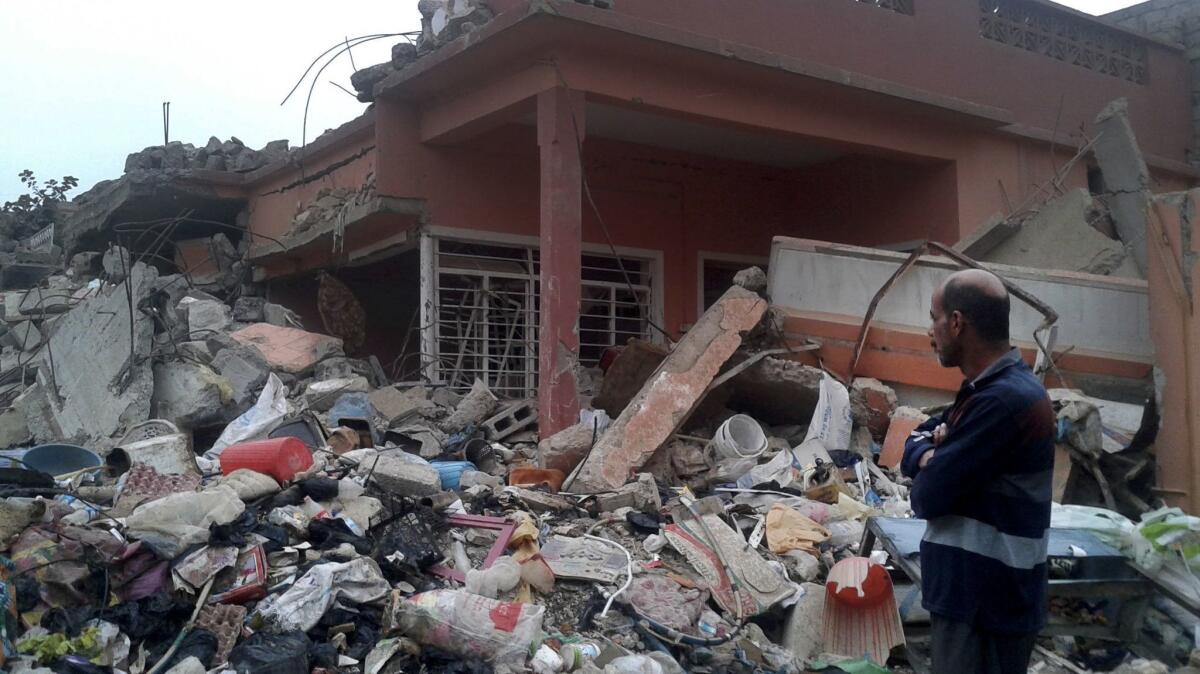
- Share via
Reporting from MOSUL, Iraq — When Ali Thanoon lost more than 50 members of his family in a U.S. airstrike during the battle against Islamic State in Mosul in the spring, he turned to the Iraqi government for compensation.
But officials required Thanoon to prove his loved ones had been killed: He could get the necessary death certificates only by digging up their bodies from a mass grave.
For the record:
11:35 a.m. Dec. 18, 2017An earlier version of this article said a review of Pentagon data shows that just three payments to civilians under the condolence program have been made to families in Iraq over the last three years. It should have said three such payments have been offered.
That would take time. Thanoon had been trapped for five days under the rubble, then hospitalized for weeks. By the time a cousin was able to take Iraqi officials to unearth Thanoon’s two wives, seven children and other relatives, all they found were “meat and bones,” Thanoon said.
“What’s this?” said one of the officials. “We need to see faces.”
But there was another hard fact: The Iraqi government’s compensation program for victims of the Mosul campaign, even those with death certificates, had no money.
For any hope of compensation for his losses, the 50-year-old shop owner would have to turn to the United States, which since the beginning of the war in Iraq has provided millions of dollars in “condolence” payments to families of civilians inadvertently killed by U.S. airstrikes or other unforeseen consequences of combat.
Their purpose is both humanitarian and strategic, a way to maintain good relations with Iraqi citizens and avoid retaliatory attacks.
Yet payments under the U.S. program plummeted after America ended its initial combat role in Iraq in 2010 — and did not pick up again when the U.S.-led coalition launched a violent new phase of the war with its assault on the militant group Islamic State.
The U.S. acknowledges that it has killed at least 801 civilians in Iraq and Syria since the campaign began in 2014. Independent monitors insist the toll is much higher: at least 5,975, according to the London-based monitoring group Airwars.
Congress has set aside at least $5 million through the end of 2018 for payments to civilians under the condolence program. But a review of Pentagon data shows that just three such payments have been offered to families in Iraq over the last three years — and none were offered in Syria.
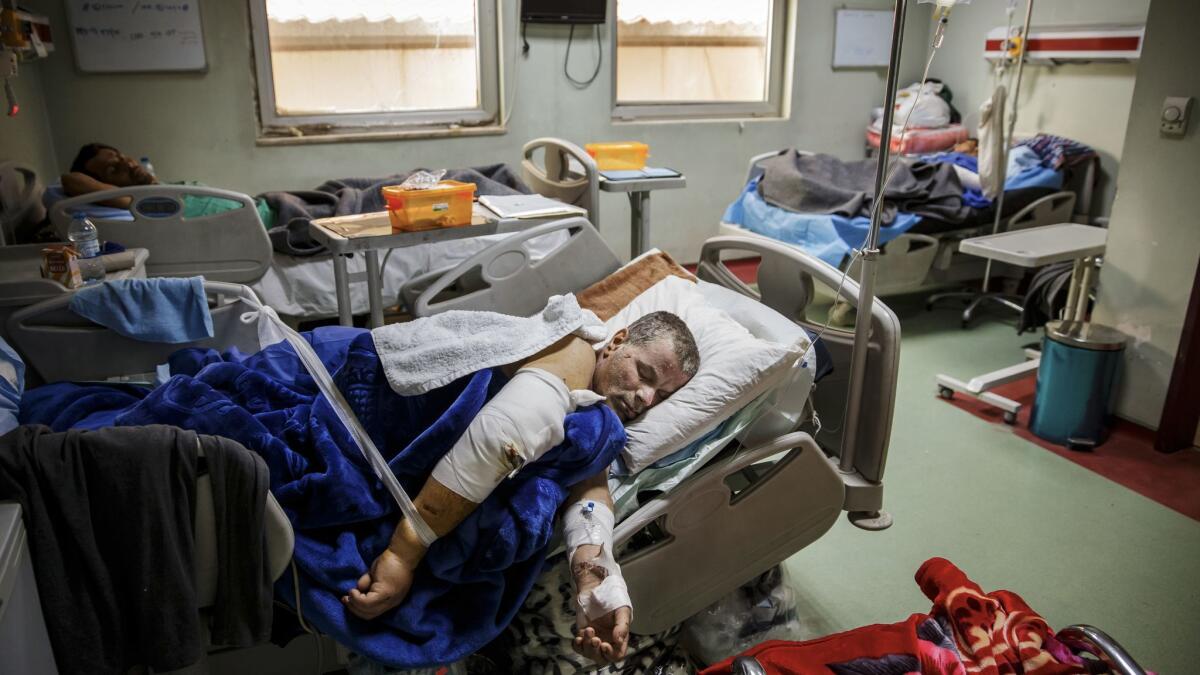
In the highest-profile incident of civilian casualties during the current campaign, a devastating strike that hit Thanoon’s neighborhood of Jadidah in west Mosul on March 17, more than 100 lives were lost, making it one of the deadliest civilian casualty incidents in modern American military history.
Yet a survey of the neighborhood by the Los Angeles Times last month found almost no one who had been visited by a U.S. investigator or offered compensation. Thanoon said he wasn’t even aware that a U.S. program was available.
“No one came to see us,” Thanoon said. “Where do we go? We don’t know.”
A U.S. military investigation found that the strike in Thanoon’s densely populated neighborhood, which targeted two Islamic State snipers, mistakenly killed at least 105 civilians. Residents and volunteers who responded to the scene initially said they retrieved 278 bodies; Thanoon’s family now puts the death toll at 155.
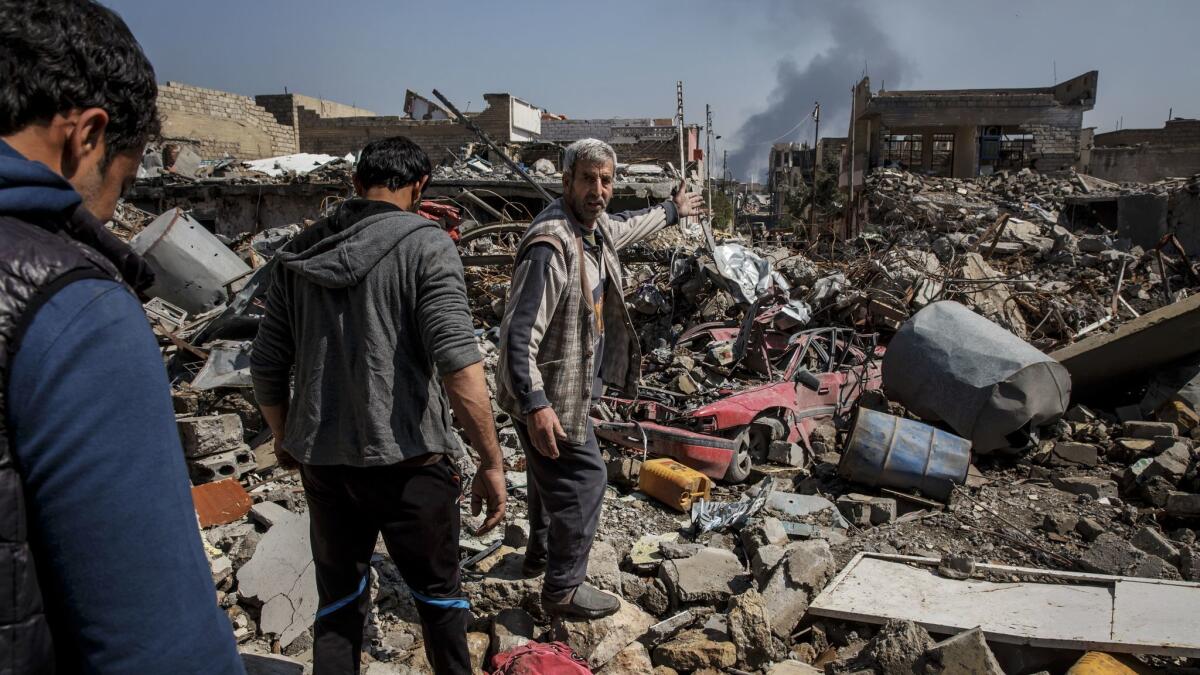
Eric Pahon, a Pentagon spokesman, said the condolence program has been difficult to administer with few U.S. ground troops in the region. Areas controlled by Islamic State have in many cases been impossible to access, he said.
Still, Sen. Patrick J. Leahy (D-Vt.), who wrote a 2014 law that set aside money to compensate civilian victims and provided guidance to military commanders on doling it out, questioned why just one payment has been offered for the Jadidah strike.
“When we make tragic mistakes like that, and innocent people are harmed, [the Defense Department] has the authority and funding to help them or their families,” Leahy said. “There is no good excuse for not doing that.”
The U.S. has made condolence payments in various countries, including Afghanistan and Iraq, where commanders initially paid claims from a fund created out of the millions of dollars confiscated from Saddam Hussein’s Baath Party. Payments are based on the severity of injury, type of damage, what is considered culturally appropriate and prevailing economic conditions. To qualify, civilians must be deemed “friendly” to the U.S. and their losses cannot have been caused by enemy operations. Each payment goes to the head of household and is not considered an admission of wrongdoing.
The U.S. generally paid a maximum of $2,500 per death in a given household, although officials could pay claims in excess of $100,000 in “extraordinary cases,” according to a 2010 report to Congress. Since the end of 2013, the average condolence payment in Afghanistan was less than $5,000; the highest $20,000, Pahon said.
In cases where $2,500 would be considered “insulting,” such as the death of a local sheik, commanders considered alternatives such as installing a commemorative plaque or funding a local public works project.
Craig Whiteside, a professor of national security studies at the Naval War College in Monterey, made such payments as an infantry commander in Iraq and said they showed good faith, helped combat insurgent recruitment and were “chump change” compared with what was spent on bombs.
“We could give $15,000 per family, and that would be the best money we’ve spent today in the federal government,” he said.
Chris Kolenda, who served in Afghanistan, said he made the payments to civilians because “it makes a substantial difference in terms of their sentiment” and “in these types of wars, population sentiment is the coin of the realm.”
Kolenda, now an adjunct senior fellow at the Center for a New American Security, had worked with the U.S. government to pay civilians harmed by airstrikes. He said he never required those applying to “desecrate a grave,” as authorities in Mosul are routinely requiring. He called such measures a “poison pill designed to ensure no one makes a claim.”
“You have to train people to do it right, and you have to have some kind of process,” he said. “It’s unfortunate that to date there hasn’t been a concerted effort to address those challenges.”
Last year, the U.S. government made a single, $2,500 condolence payment, though officials declined to say to whom it was paid.
“For the safety of the recipients, as well as respect for their privacy, we generally do not release specific information regarding payments for property damage, personal injury or death, including amounts that were authorized,” Pahon said.
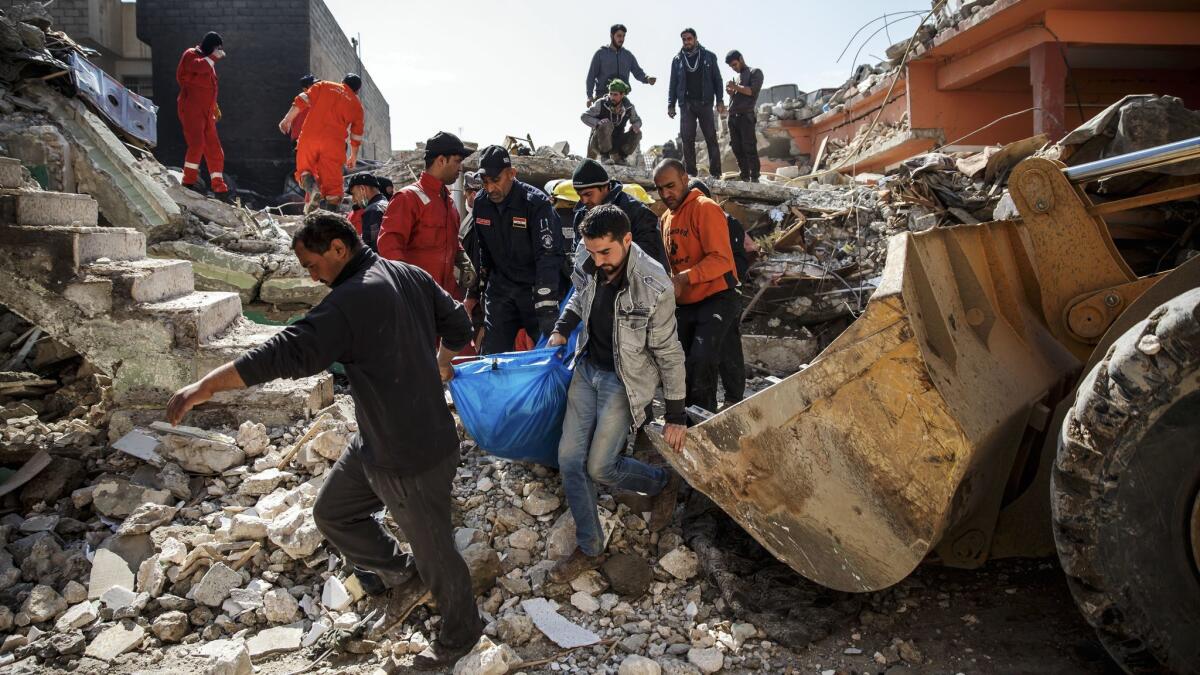
This year, $15,000 was offered to an east Mosul resident, Basim Razzo, who applied to the U.S. Embassy in Baghdad in connection with an airstrike on his home and his brother’s next door that killed four family members in 2015. Razzo and his sister-in-law survived.
The strike there on Sept. 21 was initially reported as having occurred the day before and claims of coalition-caused casualties were dismissed as noncredible because of confusion over dates, the coalition said via email. After journalists and advocates followed up, the coalition said it found “a potentially corroborating strike.” It said authorities investigated, confirmed and “took responsibility for four deaths and two injuries.”
Razzo applied on behalf of the entire family, but was only offered the $15,000 payment for the loss of his wife and 21-year-old daughter. Because payments are made to the head of household, Razzo was not offered anything for the deaths of his brother and 18-year-old nephew.
“When they realized what the amount was, they did not bother applying,” Razzo said of his brother’s family.
Razzo, 58, refused the money, which he considered so little it was insulting. He said he has not received compensation from the Iraqi government either.
Pahon declined to say who was offered the payment in connection with the Jadidah strike, or how much was offered. The payment was declined, he said.
It’s unclear why other victims of the Jadidah airstrike were not offered payments, but they probably were unaware they could apply. The U.S. does not post notices advising residents they are eligible for the payments, Pahon said. He said the U.S. did not receive any other applications for condolence payments after 2014.
“The ability to make such payments in Iraq and Syria may be particularly limited given the current operational environment and the limited U.S. military presence on the ground,” Pahon said. “Unlike counterinsurgency operations in Iraq before 2011 or in Afghanistan a few years ago, U.S. forces do not currently have widespread, day-to-day interaction with the local population in Syria or Iraq.”
After the strike, military investigators led by U.S. Air Force Brig. Gen. Matthew Isler issued a lengthy report acknowledging that a U.S. plane dropped a 500-pound bomb on a two-story structure where scores of civilians were sheltering from a raging battle between Islamic State militants and Iraqi special forces. The report said the bomb ignited a cache of explosives the militants had placed in the building, causing a massive secondary explosion that collapsed the structure and part of a neighboring building.
Isler recommended that the Pentagon intensify its examination of civilian airstrike casualties, and five people were added to the investigating team. Since then, the number of confirmed civilian casualties has more than tripled, but there has been no corresponding uptick in condolence payments. Pahon said there have been no applications.
“Civilian victims who believe that U.S. forces damaged their property, caused them personal injury or caused the death of an innocent family member should contact the nearest U.S. Embassy or Consulate. Iraqis are welcome to contact their own government as well,” Pahon said.
Compensation is theoretically available from the Iraqi government for civilians who suffer losses at the hands of its forces and their allies. But applicants must provide death certificates. At the time Thanoon’s family was killed, there was no way to get the documents. With fighting still raging in the city, many of the dead were hastily buried in relatives’ gardens and only later transferred to morgues and cemeteries.
City authorities are now demanding that those seeking death certificates open up their loved ones’ graves, so they can confirm who is buried there, according to residents. But even if victims obtain the necessary paperwork, provincial officials say they have no money to give them.
“We are waiting for any country or any aid group to come help us with this,” said Nuraddin Qablan, deputy president of the Nineveh provincial council.
Thousands have moved back to the Jadidah neighborhood, where the souk once again teems with people. On narrow side streets, bombed-out houses reverberate with the sound of construction.
But frustration is building.
Mohammed Fadhil lost his wife of 19 years and three other family members on March 17. He spent months digging up bodies and obtaining death certificates to apply for compensation from the Iraqi government. But when he arrived at a courthouse to submit the completed claim recently, it was so crowded he gave up.
The taxi driver dreams of building a new home on a piece of land he owns outside Mosul, but he can’t afford it: He makes less than $10 a day.
For now, he and his three children are staying at a friend’s house near the remains of their former home. They have no plans to return.
“I had a good life there,” Fadhil said, “and now it is gone.”
Thanoon had two homes in the area and operated two businesses, a clothing store and a dairy — all damaged or destroyed in the fighting. His savings — about $4,000 in cash and gold jewelry — disappeared in the airstrike that killed his family as they sheltered at a neighbor’s house.
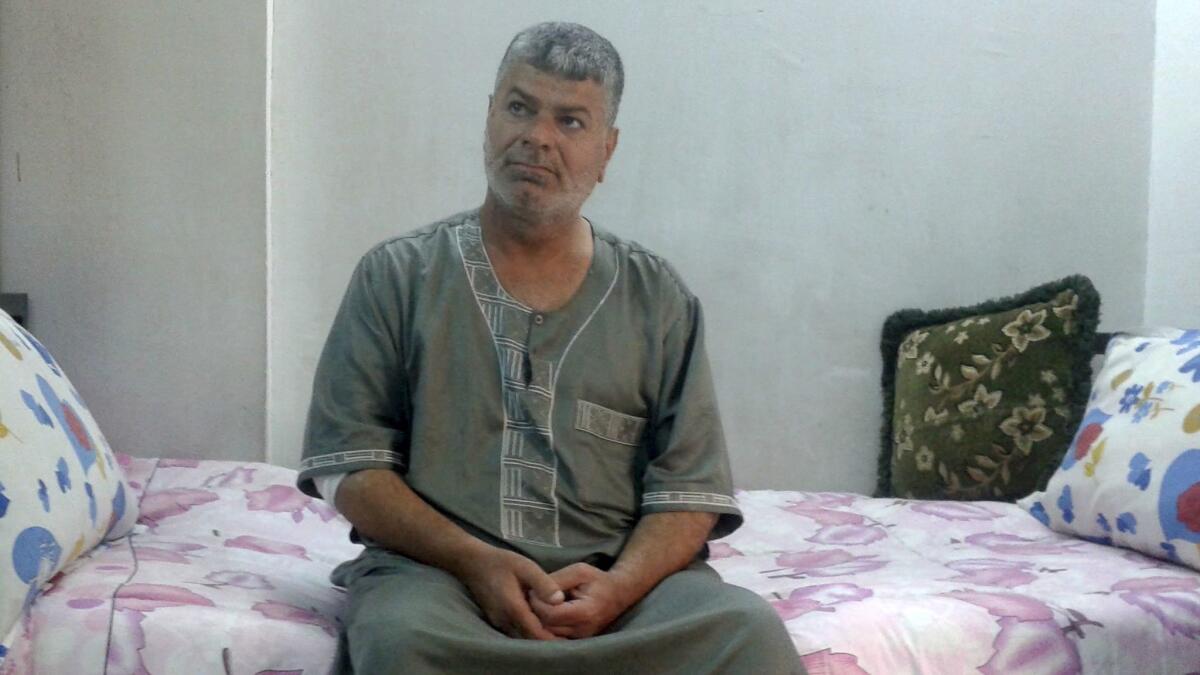
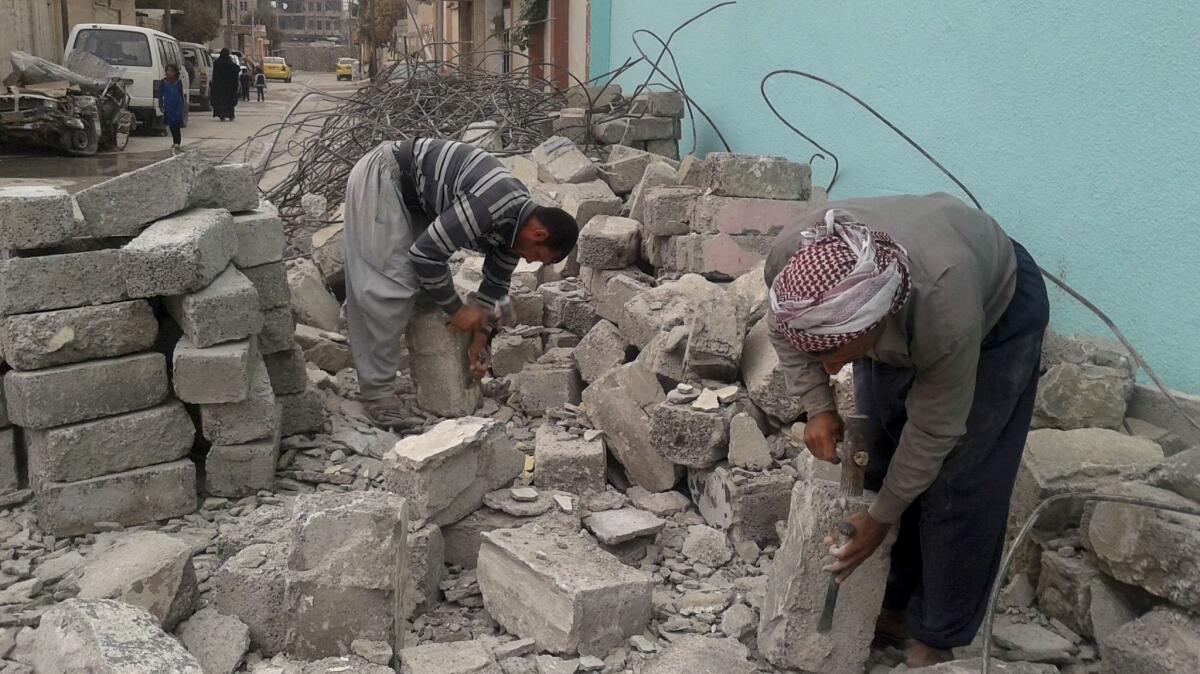
On a recent morning, he slumped on a neighbor’s front step as two laborers chipped at chunks of concrete recovered from one of his razed homes to shape them into blocks. It’s the only building material he can afford, he said.
Haunted by memories, Thanoon has started drinking for the first time in six years. Lying awake in the narrow bed set up for him in a corner of his brother’s living room, he can see his dead wives and children gathered on the sofas.
It was in this room that the family heard the news on television, months before the fateful airstrike, that the long-anticipated battle to free Mosul had begun.
“We were laughing and dancing, we were so happy,” Thanoon said, his voice breaking.
He has thought about remarrying, but wonders how he would support a new family. He suffers chronic pain, and after nine surgeries, he is still missing 75% function in his right arm, which rests in a sling.
“Sometimes I think about becoming a suicide bomber and going straight to God,” he said, cradling his injured arm. “All roads are closed to me. I can’t do anything.”
Times staff writer W.J. Hennigan in Washington and Wael Resol in Irbil contributed to this report.
molly.hennessy-fiske@latimes.com
More to Read
Sign up for Essential California
The most important California stories and recommendations in your inbox every morning.
You may occasionally receive promotional content from the Los Angeles Times.















